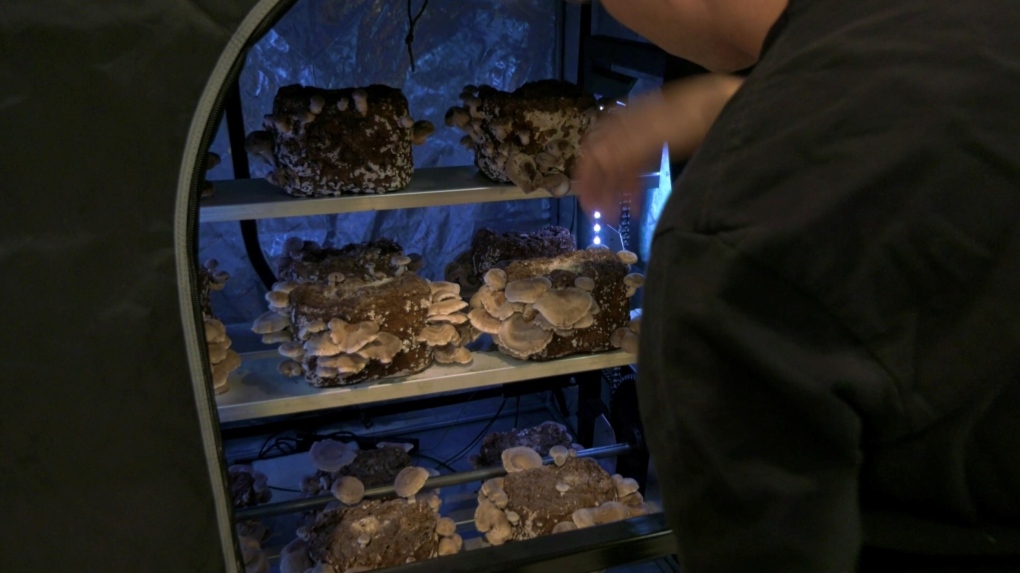Waterloo, Ont. startup using AI to grow mushrooms
A Waterloo, Ont. startup is working to give mushroom farming a boost with the help of artificial intelligence.
Mycro Harvest is based out of the University of Waterloo's startup incubator, Velocity.
It's not your typical mushroom farm and its co-founders aren't your typical mushroom farmers. That's because there's nothing typical about this farming operation.
"We're developing AI-powered smart farms for mushroom growing," said co-founder Christopher Klich.
The company will first focus on scaling production in the multi-billion-dollar fresh mushroom industry.
Mushroom farming relies heavily on manual labour and monitoring. Farmers also need to have highly technical knowledge to avoid losing crops.
"Mushrooms are a very finicky crop," said co-founder Justin Cheng.
But Mycro Harvest is looking to change that with their farm of the future, focusing on more efficient fungi farming.
They've been growing shiitake mushrooms on sawdust substrate blocks. The magic happens inside their lab version of the smart farm.
"We're using specific monitoring technology to essentially keep an eye on the blocks and detect if there's disease because contamination is a huge issue in mushroom farming," said Klich. "[It] also optimizes the environmental conditions. So that's the temperature, humidity and CO2 levels inside the growing room that these mushrooms are grown in."
 The mushrooms are grown on sawdust substrate blocks. Technology monitors temperature, humidity, CO2 levels and possible disease contamination. (Chris Thomson/CTV Kitchener)
The mushrooms are grown on sawdust substrate blocks. Technology monitors temperature, humidity, CO2 levels and possible disease contamination. (Chris Thomson/CTV Kitchener)
It's a scaled-down version of what's to come. Mycro Harvest is working toward creating growing units that are roughly the size of an 18-wheeler truck.
"A regular mushroom container, when you buy it at the grocery store, is about one pound. So we're talking about outputting between 3,000 to 4,000 of those little mushroom containers every month per grow unit," said Klich.
The startup says their smart farm will not only scale up production, but it will do so at less than the market rate of traditional farms.
"So the AI, you can imagine being a replacement for that skilled grower that's required to come in multiple times a day that has years of experience growing this crop and kind of qualitatively tell what they need," Cheng said.
CTVNews.ca Top Stories

Poilievre writes to GG calling for House recall, confidence vote after Singh declares he's ready to bring Liberals down
Conservative Leader Pierre Poilievre has written to Gov. Gen. Mary Simon, imploring her to 'use your authority to inform the prime minister that he must' recall the House of Commons so a non-confidence vote can be held. This move comes in light of NDP Leader Jagmeet Singh publishing a letter stating his caucus 'will vote to bring this government down' sometime in 2025.
School custodian stages surprise for Kitchener, Ont. students ahead of holiday break
He’s no Elf on the Shelf, but maybe closer to Ward of the Board.
Kelly Clarkson's subtle yet satisfying message to anyone single this Christmas
The singer and daytime-talk show host released a fireside video to accompany her 2021 holiday album, “When Christmas Comes Around” that she dubbed, “When Christmas Comes Around…Again.
Judge sentences Quebecer convicted of triple murder who shows 'no remorse'
A Quebecer convicted in a triple murder on Montreal's South Shore has been sentenced to life in prison without chance of parole for 20 years in the second-degree death of Synthia Bussieres.
At least 2 dead, 60 hurt after car drives into German Christmas market in suspected attack
A car plowed into a busy outdoor Christmas market in the eastern German city of Magdeburg on Friday, killing at least two people and injuring at least 60 others in what authorities suspect was an attack.
16-year-old German exchange student dies after North Vancouver crash
A 16-year-old high school student from Germany who was hit by a Jeep in North Vancouver, B.C., last weekend has died in hospital, authorities confirmed.
Poilievre to Trump: 'Canada will never be the 51st state'
Conservative leader Pierre Poilievre is responding to U.S. president-elect Donald Trump’s ongoing suggestions that Canada become the 51st state, saying it will 'never happen.'
Canadiens executive says he has 'no concern' about members of the front office travelling to Russia
Montreal executive vice president of hockey operations Jeff Gorton said he has 'no concern' about members of the Canadiens' front office travelling to Russia with the country’s war in Ukraine ongoing.
Speeding drivers get holiday surprise from 'Officer Grinch'
Drivers in the Florida Keys who exceed the speed limit in school zones may run into a well-known gloomy green creature and get a surprising 'gift.'


































